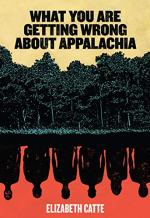
|
| Name: _________________________ | Period: ___________________ |
This test consists of 15 multiple choice questions and 5 short answer questions.
Multiple Choice Questions
1. Catte describes Judy Bonds as a grandmother who "became the face of" (98) what type of activism?
(a) Anti-mountaintop-removal.
(b) Anti-gold mining.
(c) Anti-erosion.
(d) Anti-fracking.
2. Both Murray and Vance are said to claim what ancestry?
(a) Welsh.
(b) Scots-Irish.
(c) Greek.
(d) French.
3. Catte claims that Harry Caudil's work drew attention away from what other important cause?
(a) The Women's Liberation movement.
(b) The Gay Rights movement.
(c) The Women's Suffrage movement.
(d) The Civil Rights movement.
4. In what year did Ollie Combs endeavor to conduct a protest against her land being destroyed by bulldozers?
(a) 1925.
(b) 1985.
(c) 1945.
(d) 1965.
5. On what holiday does Catte portray Ollie Combs as eating alone in her jail cell?
(a) Easter.
(b) Thanksgiving.
(c) Christmas.
(d) Labor Day.
6. The "the most offensive 'Trump Country'" (98) essay Catte has encountered was published in what publication?
(a) The Louisville Tribune.
(b) The National Review.
(c) The New Republic.
(d) The Charleston Gazette.
7. William Shockley claimed that his research led him to what conclude that African Americans were predisposed for what characteristic?
(a) Reduced life spans.
(b) Low intelligence.
(c) Reduced fertility.
(d) Increased rates of heart disease.
8. Harry Caudill sent William Shockley an encouraging letter in what year?
(a) 1924.
(b) 1934.
(c) 1954.
(d) 1974.
9. In what year did Harry Caudill pass away?
(a) 2003.
(b) 1979.
(c) 1938.
(d) 1990.
10. Charles Murray is described as having taken what action before later describing it as "a teenage prank" (88)?
(a) Burning a cross.
(b) Wearing blackface.
(c) Killing a cat.
(d) Robbing a house.
11. In what county did Dan Gibson use "armed resistance to route bulldozers off his family land" (100)?
(a) Jackson.
(b) Broward.
(c) Mabel.
(d) Knott.
12. Arthur Rothstein was known for documenting the lives of those evicted from their homes as a result of what construction project?
(a) A zoo.
(b) A national park.
(c) A protected marshland.
(d) A coal mine.
13. Catte states that when she imagines her region's history, she sees what objects?
(a) Photographs.
(b) Shadows.
(c) Gravestones.
(d) Smiles.
14. Harry Caudil's work focused on which group of people within Appalachia?
(a) Poor African Americans.
(b) Poor whites.
(c) Orphans.
(d) Poor Latin Americans.
15. The FSA was created in an attempt to combat a particular societal ill by resettling whom?
(a) Appalachians.
(b) Native Americans.
(c) Impoverished farmers.
(d) Unemployed coal miners.
Short Answer Questions
1. In what state did Dan Gibson use "armed resistance to route bulldozers off his family land" (100)?
2. What adjective does Catte use to describe the action Appalachians took "against corporate interests" (102)?
3. In what year did the sheriff of Pike County, Kentucky order a raid on the home of community organizers Karen and Joseph Malloy?
4. In what year was Carl Braden arrested and convicted of sedition against the government for helping to purchase a home for an African American family?
5. William Shockley worked as a scientist at what institution when he emerged as a leader within a particular movement?
|
This section contains 439 words (approx. 2 pages at 300 words per page) |

|




